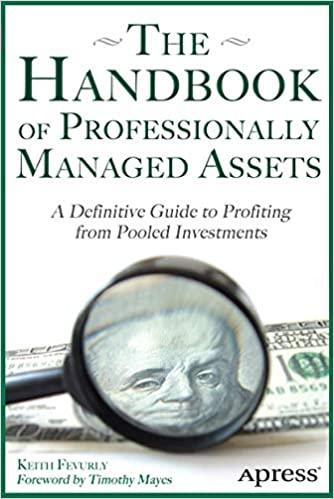Question
You have a loan outstanding. It requires making five annual payments of $2,000 each at the end of the next five years. Your bank has
- You have a loan outstanding. It requires making five annual payments of $2,000 each at the end of the next five years. Your bank has offered to allow you to skip making the next four payments in lieu of making one large payment at the end of the loan's term in five years. If the interest rate on the loan is 3%, what final payment will the bank require you to make so that it is indifferent to the two forms of payment?
2. What is the present value of $9,000 paid at the end of each of the next 89 years if the interest rate is 11% per year?
3. Assume that your parents wanted to have $160,000 saved for college by your 18th birthday and they started saving on your first birthday. They saved the same amount each year on your birthday and earned 10.5% per year on their investments. a. How much would they have to save each year to reach their goal? b. If they think you will take five years instead of four to graduate and decide to have $200,000 saved just in case, how much would they have to save each year to reach their new goal?
4. You are trying to decide how much to save for retirement. Assume you plan to save $7,500 per year with the first investment made one year from now. You think you can earn 9% per year on your investments and you plan to retire in 27 years, immediately after making your last $7,500 investment. a. How much will you have in your retirement account on the day you retire? b. If, instead of investing $7,500 per year, you wanted to make one lump-sum investment today for your retirement that will result in the same retirement saving, how much would that lump sum need to be? c. If you hope to live for 18 years in retirement, how much can you withdraw every year in retirement (starting one year after retirement) so that you will just exhaust your savings with the 18th withdrawal (assume your savings will continue to earn 9% in retirement)? d. If, instead, you decide to withdraw $80,000 per year in retirement (again with the first withdrawal one year after retiring), how many years will it take until you exhaust your savings? e. Assuming the most you can afford to save is $1,500 per year, but you want to retire with $1,000,000.00 in your investment account, how high of a return do you need to earn on your investments?
5. You have an investment account that started with $4,000 10 years ago and which now has grown to $9,000. a. What annual rate of return have you earned (you have made no additional contributions to the account)? b. If the savings bond earns 16% per year from now on, what will the account's value be 10 years from now?
6. You are saving for retirement. To live comfortably, you decide you will need to save $4 million by the time you are 65. Today is your 34th birthday, and you decide, starting today and continuing on every birthday up to and including your 65th birthday, that you will put the same amount into a savings account. If the interest rate is 10%, how much must you set aside each year to make sure that you will have $4 million in the account on your 65th birthday?
Step by Step Solution
There are 3 Steps involved in it
Step: 1

Get Instant Access to Expert-Tailored Solutions
See step-by-step solutions with expert insights and AI powered tools for academic success
Step: 2

Step: 3

Ace Your Homework with AI
Get the answers you need in no time with our AI-driven, step-by-step assistance
Get Started


